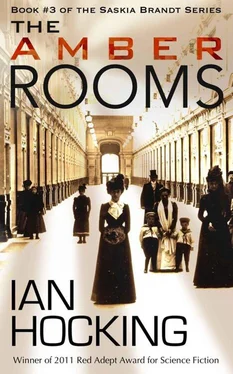Saskia ran to her horse. Short moments remained until the soldiers and gendarmes posted around Tiflis converged on the square. Her horse refused to move smartly through the debris until she kicked it on. Kupriashvili overtook her at a sprint. She saw him reach the carriage. He was too close to toss his bomb but he did. The explosion threw him against a railing and injured several crouched bystanders. The gut-blown horse toppled and the carriage trundled into the wall of a saloon, where it stopped. Kupriashvili rolled on the cobbles, screaming, holding his ears, calling for Saskia as she now cantered past him.
Datiko Chibriashvili jumped into the rear of the carriage and lifted a money bag. He paused. Stared at Saskia. Police whistles carried through the air. Rifles were being fired in the pattern that called all gendarmes and militiamen to arms.
Chibriashvili said, ‘What shall I do with this?’
Saskia’s reply was interrupted by a familiar voice from the square behind her. She turned to see Kamo circling the smoky, ruined carriage in a stolen phaeton. He held the reins in his left hand and, with his right, emphasised his shouts with shots from a Mauser.
‘Here!’ she called.
The phaeton almost toppled as Kamo swung into the street. He clattered to a halt next to Saskia. His horses nodded against their harnesses.
‘To me,’ he said.
Saskia jumped into the carriage and helped Datiko fling the satchels at Kamo. Each was half the size of a man. Kamo fired his Mauser at approaching militiamen and Saskia landed aboard, pushing Kamo so she could sit alongside him on the driver’s bench and they cantered away. The gendarmes shot at them but their bullets told and the sun was brighter and Kamo told Saskia that he loved her, even with the whiskers.
She smiled.
They took the first street at a canter and the second at a trot. She hid her face as they passed the Viceroy’s Palace. Cossacks were mounting their horses and turning under conflicting orders barked by their commanders. The Deputy Police Chief, Balabansky, stared at Kamo and raised his gun, but Saskia, remembering her role of cavalry captain, pointed to the insignia on her shoulder and shouted, gruffly, ‘The money is safe! Secure the square!’
The Police Chief paused. Then he waved them through.
He will regret that. In a few days, he will shoot himself through the heart.
Kamo drove to the joiner’s yard on Vtoraya Goncharnaya Street. The old woman who owned the yard, Babe Bochoridze, closed the gate and called to the gendarme across the street that it was over. Captain Zubov nodded and walked away without firing a shot. He was due a share of the spoils.
In the darkness of the stall, Kamo took Saskia’s hand and kissed it.
~
They forced themselves to eat a small lunch. Shots and fire bells could still be heard. Later, she walked through a house and swapped hats with Patsia Goldava. She crossed the street by hopping a small gap between one second-floor window and the next; accepted a cloak from the sombre Kupriashvili, and two kisses of congratulation; and re-emerged on the steep cobbles without the agents on her tail, still moving, always moving.
~
At midnight, she joined Kamo in the house of Bochoridze and his wife, Maro. The three were sewing the stolen money into a mattress. She led Kamo to the Kura and they both washed. It was icy and good and reminded Kamo of the high mountains. His wounded eye wept and she covered it with a palm and shushed him. When they returned to the house, Bochoridze and his wife did not look up. Revolutionaries might die now or later. They took the mattress to the high, quiet observatory where Soso had once worked and laid it on the couch of the director. Then the dawn came from the tops of the mountains down.
~
Saskia found a samovar in the kitchen of the Tiflis Physical Observatory and made coffee. She wore a skirt and a loose blouse. Her clothes would shock, but the observatory was unstaffed. The Director and his students had been paid off. The coffee was syrupy and black. She put a covered cup next to Kamo—he had slept on the money mattress, and still dozed—and walked onto the balcony. There she stood at the overlook in the few, short hours of cold before the heat came with the brightening sun and confined climate of Tiflis.
She took a full breath of Caucasia. The bare mountains were cut by the Kura, which in turn divided the city. She was too far to see individuals without concentrating. She considered Yerevan Square, the gardens, the handsome bridges and the cathedrals. One of the cathedrals was Armenian. A steam engine slid into the city. It was bound for Baku on the Caspian. Already, the striking of anvils had begun. Plate, guns, swords: easy births each one.
When Soso arrived, she did not hear him. She hardly felt his lips when he kissed her cheeks and called her his brave Lynx.
‘You’ll miss your train to Baku,’ she said.
Soso leaned on the balcony rail and looked down. He was dressed for travel. ‘Are you hurt?’
‘No. How is everyone?’
‘They are well.’
‘And the civilians?’
Soso removed his Fedora and knocked its brim against the edge of the rail. It might have been a signal. His feline, amber eyes turned on her.
‘A wise man said that public opinion has the same importance for the authorities as a topographical map has for an army commander. We have ceded some ground, nothing more, but have extended the reach of the Party.’
Saskia looked at him. Extended the reach? It would buy some bribes and support the trinity of inventions that had so catalysed revolutionaries around the world: the high-speed printing press, rail travel, and dynamite. The dead people in the square could hardly be worth that.
There was no direct challenge in her eyes, but Soso would not fail to perceive her mood. Abruptly, he smiled, and said, ‘Kamo tells me that you cannot die.’
‘That’s foolish.’
‘But you told him.’
‘I was joking.’
‘Tell me the story.’
‘I will not.’
Soso shrugged. ‘Perhaps you have a destiny.’
‘Who doesn’t?’ she said, though the remark turned her cold. ‘That’s an empty statement.’
‘You are an intelligent women. We can discuss destiny.’
With an ironic smile, she said, ‘You first.’
He gestured towards the grey mountains in the north-west. ‘I was born in Gori. Have you been there? It is a superstitious, backward place. Once a year, the smiths strike their anvils deep into the night. This prevents Amiran from descending to the village from his mountain.’
‘Who is Amiran?’
Soso cleared his throat. For the first time since she had known him, he appeared uncomfortable.
‘My father. Let me tell you about him. He was a drunkard who beat me every day and opposed my induction in the seminary. He hated me. He did not care that I was first in my class of rich kids. He beat my mother as much as me. When he left Gori, however, the lesson was learned. She assumed the role of beater and bruised me from head to foot.’
Saskia said, ‘The Russian verb “to beat” sometimes means “to educate”, comrade.’
‘I want to change the subject. Did you read my pamphlet on Darwin and Marx?’
‘Actually, I have,’ she said. It would not do to antagonise the Boss, but her direct involvement in the heist had given her a distaste for his wordy, poetic abstractions. ‘I’m surprised you see them as compatible.’
‘Why not? Remember Linnaeus, who wrote, “Nature does not make leaps”. Darwin has inked over the pencil sketches of Linnaeus. For him, the process of our development from the simple ancestor to our current form is one of gradual realisation.’
Читать дальше












